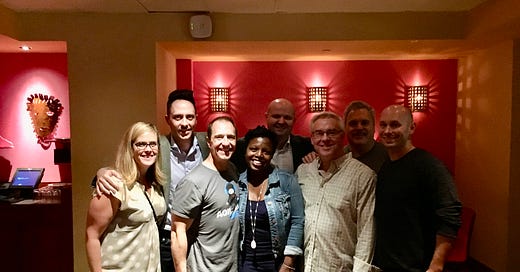The Untold Pressures of Executive Leadership
Before you blame leadership for your business challenges, read this.
There’s a familiar narrative inside most organizations:
“Leadership isn’t doing enough.”
“The C-suite doesn’t get it.”
“The execs are the reason this transformation is stuck.”
I hear it often. And I get it—when you’re in the trenches and things are messy, it’s easy to look upward and assign blame.
But I’ve been in those roles—at Laureate, where I led Digital Business Transformation, at Accenture, where I managed a portfolio of accounts, a practice, and several layers of consultants. Today, as a VP at Scaled Agile, and I’ve spent years advising other executives with full P&L responsibility across industries.
I’ve seen the view from the top, and I’ve helped leaders navigate the fallout from decisions no one else wanted to make.
Let’s pull back the curtain.
If you're frustrated with leadership—or if you're in leadership and feeling the weight—this one’s for you.
You’re Always On—And Often Alone
Being an executive means living under constant observation.
You're expected to project calm and confidence—even if you're walking into chaos.
You're expected to inspire—even if you barely slept.
You show up every day, because people are counting on you to hold the line.
But behind closed doors, it’s often a different story: quiet self-doubt, private anxiety, and the knowledge that there’s no safety net if you falter.
You See the Whole Board—Others See a Square
Criticism is easy when you're not holding all the variables.
Executives don’t just make decisions—they manage trade-offs:
Speed vs. sustainability
Cost vs. innovation
Short-term results vs. long-term resilience
What might look like “inaction” from the outside is often the result of hard-earned caution, calculated risk, and competing constraints that no one else can see.
You Absorb the Pressure of the Entire System
Executives are more than decision-makers. They’re shock absorbers for the entire enterprise.
Board pressure. Shareholder demands. Employee needs. Customer complaints. Regulatory shifts. Market changes.
It all flows through you—and your job is to stay standing.
You don’t just carry the mission.
You carry the weight of what happens if it fails.
There Is No Modern Playbook
Most executive playbooks were written for a different era.
Today’s business environment is fast, volatile, and often unforgiving:
AI is transforming entire industries.
Geopolitical instability is changing global supply chains.
The workforce is demanding new models of flexibility, meaning, and trust.
Transformation has to be continuous.
And yet, leaders are still expected to deliver clarity, certainty, and direction—even when the ground is shifting beneath their feet.
The Risk Isn’t Abstract—It’s Personal
Here’s what rarely gets talked about:
If you’re an officer or senior executive, you carry legal exposure for what happens across the company. Even decisions made far from your line of sight can land on your desk—or your nameplate.
If compliance slips, if ethical lines are crossed, if something goes wrong at scale—you may be the one answering to the board, the press, or federal regulators.
The weight of responsibility isn't just psychological—it's reputational and, at times, financial.
You’re Still Human
Executives have families. They get sick. They face burnout, grief, fear, and fatigue—just like everyone else.
But in most corporate cultures, vulnerability at the top is still misunderstood. Leaders are expected to be stoic, strong, and selfless.
That silence?
It’s a slow poison.
And the best leaders I’ve known—those who actually inspire, drive change, and create movements—are the ones who do feel deeply.
Who do wrestle with the cost of their choices.
So Before You Blame Leadership...
Ask yourself:
What don’t I see from where I sit?
What trade-offs are they navigating?
And what could I do to help instead of just critique?
Transformation doesn’t fail because leaders are lazy or disconnected.
It fails when we ignore the complexity, underestimate the weight, and forget that leadership is a crucible—not a crown.
And If You’re In the Seat...
This is your reminder:
Find your people.
Build your circle.
Don’t carry it alone.
You don’t need to be perfect.
But you do need to be honest—with yourself, with your team, and with those who’ve earned the right to hear your truth.
From the battlefield to the boardroom, one lesson has stayed with me:
A warrior doesn’t complain.
He shoulders the burden, does the hard thing—and moves forward anyway.
And that’s exactly what leadership demands today.





